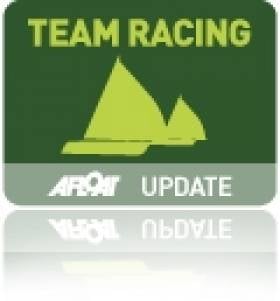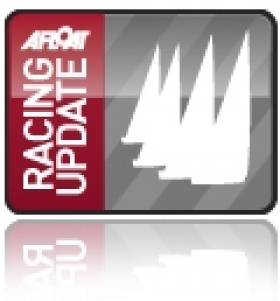Displaying items by tag: Irish Team Racing Association
Wessex Exempt win the Irish National Team Racing Championships
Wessex Exempt won the Irish National Team Racing Championships with the George Knights, making a comeback in their home club, taking second place and the title of Irish Team Racing Champions.
The only Youth team in the competition, inevitably representing Schull, finished 9th overall, out of a total entry of 20 teams. In the process they managed to beat some of the leading Irish University teams.
This event was the largest National Championships for many years, with 6 teams travelling over from the UK. 7 rounds of a Swiss League were sailed. Sailing was delayed on Saturday morning by too little wind, and by too much wind on Sunday morning!
Wessex Exempt won all their races, whilst George Knights were unfortunate to be lose against eventual 4th placed Royal Thames Vultures in the second round. If time had permuitted to sail the eigth round the result could have been very different, as the first race scheduled would have been a winner takes all competition between Exempt and the Knights. There was, however, time for a race to seperate the teams tied for second placed Irish team, the preferred option as they had yet to sail against each other. In a race somewhat marred by a large wind shift DOC beat Team Zephyr.
This event signalled a welcome return of team racing to the Royal St. George Yacht Club. The prize-giving took place in the very bar were the concept of team racing in one-design dinghies was originally conceived after race between the "George" and West Kirby SC. Amazingly, the boat chosen for the first event was the Firefly dinghy, still the dinghy of choce for team racing. The links between the Royal St George and West Kirby S.C. Continue to this day One of the helms sailing for the victorious Wessex Exempt habitually sails for West Kirby, and one of the event's umpires is cheif umpire for West Kirby's prestigious Wilson Trophy.
Full results:
Irish Team Racing Championships
1. Wessex Exempt 7 wins
2. George Knights 6 wins
3. Royal Thames Red 5 wins
4. Royal T Vultures 5 wins
5. S Male Voice Choir
6. Team Zephyr 5 wins (third Irish team after sail off with DOC)
7. DOC 5 wins
8. Univ. Limerick 4 wins
9. Schull 4 wins (First Youth team)
10. Wet Dream Team 3 wins
11. The Big Fun 3 wins
12. Univ. Southhampton 3 wins
13. UCD 1 3 wins
14 Shalumni 2 wins
15 Glitter Fingers 2 wins
16. UCD 2 2 wins
17. UCC 1 2 wins
18. Trinity 2 wins
19. UCC 2 1 win
20. UCD 3 1 win
Selection Procedure for Team Racing Worlds Underway
The selection procedure to designate the teams to represent Ireland at the ISAF Team Racing Worlds is underway.
Teams wishing to be considered for selection should contact the Irish Team Racing Association a [email protected]. A selection committee will then invite teams to trials to be sailed early in 2011. Invitations will be issued on the basis of the results of all team members (helm and crew) in 2009 -2010.
The trials will consist of a multiple round robin event. The Youth trials will be sailed in Crosshaven, and the senior trials in Dun Laoghaire. Unfortunately, the number of places available for Ireland at the World Championships is not yet known, but ITRA will select two senior teams, plus a reserve team, and two Youth teams, plus a reserve.
Team Racers Head for Schull
This season's Irish Team Racing Association's (ITRA) National Team Racing Championships will be sailed in Schull on 13th - 14th November. As excitement mounts for next year's ISAF Team Racing Worlds, entries for this year's event have hit a record 21. With 4 teams travelling from the UK, 6 Youth teams, all from Munster, the two Royal St George teams, quarter finalists in this years UK Open (better known as the Wilson Trophy), plus the top college teams the competition should be intense.
To ensure that the competition is fair and sailed to the rules the umpire team includes 4 International Umpires, and includes umpires from the USA, the UK and even Dublin. Race organisation by the Fastnet Marine and Outdoor Education Centre will provide a full dress rehearsal for next year's event. A presentation of plans for the Worlds will be held on Saturday evening, but for competitors the major attraction will be the opportunity to sail the prototype of the specially designed boat that will be used next year.
Following this event the top Irish team racers will be invited to put themselves forward for selection for the teams to represent Ireland in both the Open and under 19 categories at the Worlds. ITRA will invite selected teams to a trial event to be held early in 2011.
For further information please contact: Gordon DAVIES, Secretary, Irish Team Racing Association. Ph; 086 150 1220

























































